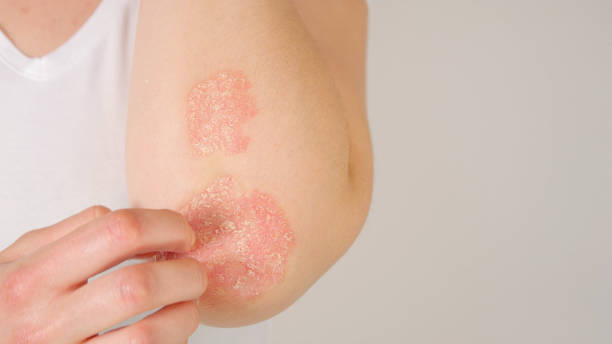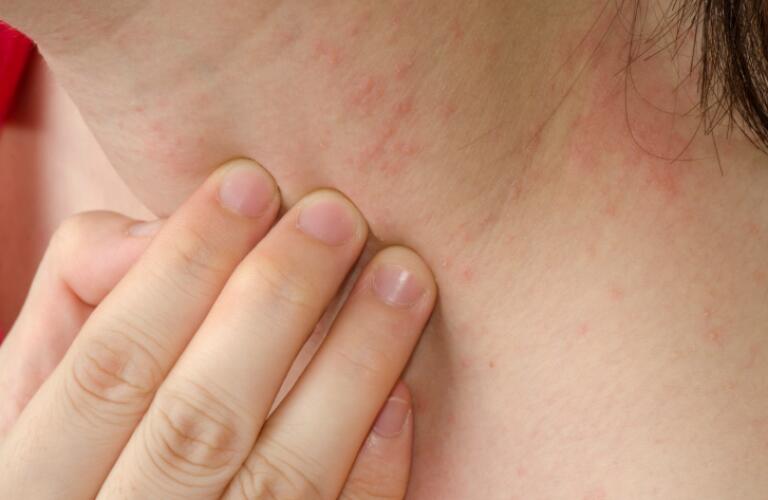A Guide To Sensitive Skin: Eczema And Psoriasis

Coping with a skin condition like eczema and psoriasis can be mentally and physically exhausting. It can affect your self-esteem and cause discomfort in your skin. To help maintain your skin’s health and appearance, it is important to note the difference between eczema and psoriasis.
Here is an overview of the topics:
- What is Eczema?
- What is Psoriasis?
- Similarities Between Eczema vs Psoriasis
- The Difference Between Eczema vs Psoriasis
- Eczema on the Face vs Body
- Psoriasis on the Face vs Body
- Can Eczema or Psoriasis Affect More Than Your Skin?
- Best Topical Treatments For Eczema and Psoriasis
- Skincare Ingredients to Avoid
- Best Product to Treat Eczema and Psoriasis
WHAT IS ECZEMA?
Eczema or atopic dermatitis is a chronic inflammatory skin condition that causes dry and itchy skin. The skin condition is commonly found in but not limited to children. Eczema that is developed in childhood can also follow the individual into adulthood.
Common Symptoms of Eczema:
- Dry skin
- Itching
- Bumpy and/or thickened skin
- Red or brownish patches of skin
Eczema is a non-contagious long-lasting skin condition with periodic flare-ups. Currently, there is no cure for eczema.
WHAT IS PSORIASIS?
Psoriasis is an autoimmune skin disease. The skin disease causes itchy rashes and scaly patches. You might be asking yourself how the immune system is related to psoriasis. Think of it like your body is attacking itself because it thinks tissues are foreign invaders.
Common Symptoms of Psoriasis:
- Patchy raised skin
- Shades of purple, pink, brown, or gray. Sometimes even black
- Itchiness
- Soreness
- Dry skin
- Rashes flare up for a few weeks or months
Psoriasis is not contagious and currently, there is no cure.

SIMILARITIES BETWEEN ECZEMA AND PSORIASIS
First off, eczema and psoriasis are not contagious. Also, there are no cures for either. Eczema and psoriasis have similar symptoms.
Here is a list of similar symptoms:
- Patchy red skin
- Itchiness
- Appear on arms, hands, legs, and scalp
Eczema and psoriasis are similar in appearance, but affect people differently.
THE DIFFERENCE BETWEEN ECZEMA AND PSORIASIS
It is a common mistake to pair eczema and psoriasis together because of their similar appearances. The key difference between the two is the intensity of pain and/or discomfort. Itching caused by psoriasis can be mild to moderate whereas eczema itching can be more intense and painful.
A list of other critical differences between eczema and psoriasis:
- Cause. Psoriasis is caused by overactive cells that stack up to the surface, creating thick dry scaly patches of skin that can become painful. The cause of eczema is unknown, but experts assume that the skin condition is related to genetic and environmental factors.
- Age. Psoriasis occurs between the ages of 15-35. Eczema commonly shows up in babies and children, but it appears in adults differently. All ages can experience these conditions.
- Medical terminology. Psoriasis is an autoimmune disease. Eczema is a chronic skin condition.
- Affect. Psoriasis can increase the risk of cardiovascular disease, psoriatic arthritis, or Crohn’s disease
ECZEMA ON THE FACE VS BODY
It is very common for eczema to appear on the face first and then spread to other parts of the body. Eczema on the face can feel extremely dry and rough like sandpaper. The skin condition can range from mild to severe. Mild eczema involves dry and itchy red skin. Severe eczema constitutes bleeding and cracking skin. Eczema can appear in different colors depending on skin tone. For example, eczema can appear pink or red on lighter skin or brown, gray, or purple on darker skin.
PSORIASIS ON THE FACE VS BODY
Psoriasis can appear anywhere on the body. However, it is common for it to appear on the elbows, knees, and scalp. It can also appear on parts of the body that fold like eyelids or the area behind the knees. The only difference between psoriasis on the face vs the body is the fact that facial skin is thinner, causing the skin to respond more sensitively to treatments.

CAN PSORIASIS OR ECZEMA AFFECT MORE THAN SKIN?
As said before, psoriasis can help risk developing other conditions. It is not fully understood how psoriasis can develop comorbidities, but experts believe it is related to systemic inflammation and the immune system.
Eczema can negatively affect your self-esteem. It is common for people with eczema to suffer from emotional issues because they often tie their appearance to their confidence.
BEST TOPICAL TREATMENTS FOR ECZEMA AND PSORIASIS
Eczema can go away on its own, but for some eczema is here to stay. Doctors typically recommend the following to treat eczema:
- Creams. Hydrocortisone cream treats itching and irritation
- Hydrating moisturizers
- Antihistamines. Won’t stop eczema from flaring up, but it does help relieve itching
Psoriasis is a chronic condition that cannot go away on its own.
Here is a list of doctor recommend topical treatments:
- Retinoid. A synthetic form of vitamin A that slows down skin cell growth (Ex: Tazarotene, acitretin, and more)
- Corticosteroids. Highly potent steroid hormone for treating mild to moderate psoriasis
- Salicylic acid. A peeling agent that helps shed the outer layer of the skin
Ingredient lists and labels can be overwhelming to look at so you must always consult with a doctor before using a new product or ingredient.
SKINCARE INGREDIENTS TO AVOID
People with sensitive skin should avoid the following ingredients:
- Fragrances. Look for labels that say “fragrance-free” or unscented
- Preservatives. Parabens, formaldehyde-releasers, etc.
- Skin Exfoliants. Physical and chemical exfoliants can cause dark spots and bleeding if used roughly
- Lotions with alcohol
It is important to know what ingredients you should look out for. Skin safety should be a top priority because skincare products can absorb into the skin and head for the bloodstream. Clean skincare may be the right choice for you if you have sensitive skin.

BEST PRODUCT TO TREAT ECZEMA AND PSORIASIS
Niacinamide and vitamin C are wonderful ingredients to help treat eczema. They help brighten the skin and reduce redness. Plant Mother’s Vitamin C Serum contains natural niacinamide and vitamin C. The serum is 100% clean, vegan, and organic. It’s made with ingredients freshly grown from Plant Mother’s in-house sustainable garden based in Miami, Florida. Vitamin C Serum is formulated with botanicals and 200+ antioxidants that are extremely nourishing for the skin.
Vitamin C also helps maintain oxidative stress or an imbalance between free radicals and antioxidants in the body. Oxidative stress increases when your body tries to fight the effects of psoriasis. Vitamin C helps control oxidation in the body. Plant Mother uses 100% organic and vegan vitamin C. The serum contains Kakadu plum which have 55x more vitamin C than oranges.
MEDICAL DISCLAIMER
This content is for informational and educational purposes only. It is not intended to provide medical advice or to take the place of such advice or treatment from a personal physician. All readers of this content are advised to consult their doctors or qualified health professionals regarding specific health questions. The publisher of this content does not take responsibility for possible health consequences of any person or persons reading or following the information in this educational content. All viewers of this content, especially those taking prescription or over-the-counter medications, should consult their physicians before beginning any nutrition, supplement, skincare product, or lifestyle program.
REFERENCES:
- https://www.mayoclinic.org/diseases-conditions/atopic-dermatitis-eczema/symptoms-causes/syc-20353273
- https://www.mayoclinic.org/diseases-conditions/psoriasis/symptoms-causes/syc-20355840
- https://www.ncbi.nlm.nih.gov/pmc/articles/PMC4323693/
- https://www.psoriasis.org/advance/psoriatic-disease-affects-more-than-skin-and-joints/
